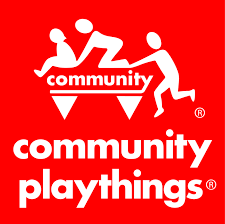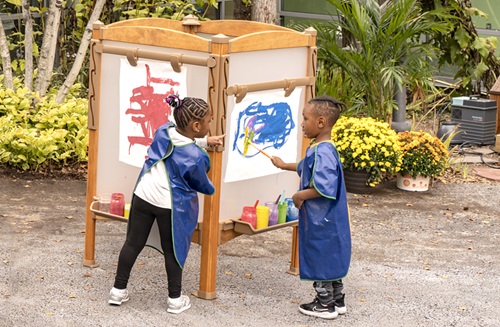Life After Nature Preschool
Exploring the Long Term Effects of Nature-Based Education
| July 2018So much has been written in the past few years about the benefits of nature play, particularly its place in early childhood education. It's not hard to find an article about the effects of nature on fine and gross motor skills, stimulating executive function, or developing an emerging environmental ethic. There are dozens of well-written, thought-provoking articles out there that stress the importance of spending time outdoors in childhood.
As someone who works in the field of nature-based early childhood education, it is thrilling to see this increasing documentation of the value of a nature-and-play-based approach to children’s learning. It reinforces what I see daily; playing outside builds resilience, encourages sensory exploration, and promotes meaningful relationships with nature and our community. What has been less examined, however, is whether or not the benefits of nature play last beyond early childhood. And if they do, how?
It is extremely difficult to trace the impact of a child’s early education experience into later years, regardless of whether those initial experiences were nature-based or not. Most of the efforts to examine the benefits of preschool in general have focused on academic success. The results of these studies are varied. This is probably because, in the words of leading Early Childhood expert, Deborah Phillips, “learning is continuous and cumulative, which makes pinpointing cause and effect within a child’s education difficult.” (Pre-School Effects: What the Research Does and Doesn’t Say, May 2017)
According to a 2017 study issued by the Brookings Institution (in cooperation with the Duke Center for Child and Family policy) there is convincing evidence that children who attend pre-K programs are more ready for school than children who do not, and that these same children show initial improvements in such academic areas as literacy and numeracy. The children who often benefit most are lower income, or non-native English language speakers, but all children appear to gain when the program features a “well implemented, evidence-based curriculum” and includes continuing professional development for teachers.
In 2001, a group of researchers from Georgetown University began tracking children enrolled in the city of Tulsa’s universal pre-K program. They followed these children all the way through middle school, and found that, in general, the children who had attended the pre-K programs tested higher in math, were more engaged in class, and were more likely to be enrolled in school honors programs. (It is worth noting that there were some exceptions, most notably among black adolescent males, but that even within these exceptions, students were less likely to be held back if they had attended a quality pre-K program.)
The quality of the pre-school program is an important factor in these studies. Researchers tend to measure the quality of a preschool by the education and certification levels of its teachers, as well as by the strength of the curriculum. In the Brookings report, researchers concluded that a poor quality program could actually reveal “null or negative longer-term impacts” on a child’s academic career.
All of this research is very exciting to those of us who work in this field. Nevertheless, I do, at times, get frustrated that the only way we seem to be able to measure a child’s long term success is through academic test scores.
Obviously, test scores are more tangible than social or emotional skills, which makes them a useful method of evaluation. But I do think it’s important that we look beyond test scores when measuring the benefits of preschool. I think this is especially important when measuring the benefits of a nature-based program, as academic test scores do not and cannot evaluate our goals of promoting kindness, empathy, or environmental awareness.
When our nature preschool was founded fifteen years ago, one of our primary aims was to help children connect to nature in a positive, meaningful, and hopefully long-lasting way. We wanted the children who left our program to continue to find comfort and joy in nature, and for their early experience in nature to translate into a sense of responsibility and advocacy as they matured. Our program was designed to lay a foundation for a lifelong relationship with the natural world, the first in what we hoped would become a series of outdoor experiences.
That is not to say that we disregard academics entirely. Nature-based programs can and should incorporate early literacy and math into their curriculum in ways that are authentic and meaningful. We strive to create critical thinkers who will actively observe and engage with the world around them. But we do not measure our program’s success by future test scores. Rather, we look at whether or not the children leaving our program enjoy learning. Do they like school? Are they excited by new ideas and by gathering information? Do they ask questions, seek answers, and share what they’ve learned with the people around them?
We also look at how they interact with their peers. Do they act with kindness and compassion toward others? Do they view their classmates as potential friends and teammates? Do they have empathy toward other living things?
And of course, we look at whether or not they continue to interact with nature as they grow older. Do they continue to spend time outside? Do they take comfort in nature? Do they care about the protection of natural spaces?
Gathering these answers as the children age out of our program is clearly not easy. We rely on communication from area teachers, who let us know how the children are faring as they progress through elementary school. We rely on parents to remain in touch, years later. So far the information we have received is purely anecdotal. But what we have learned is that in many cases these early experiences in nature do help shape the people our students become.
Take for instance, the Eagle Scout who returned to the nature center years after he aged out of our preschool program to develop his Eagle Scout project—a portable reptile teaching unit—and who made a point to invite his nature preschool teachers to attend his court of honor. “I like to give back,” he explained, “by giving younger kids the same kind of childhood I had and getting them interested in nature.”
Take the now ten-year-old former student who arrived for a visit to our preschool one muddy morning and immediately headed out to the nature play space to revisit her favorite spring-fed puddle. It was still there, as deep as ever, and she was immediately up to her ankles in thick, boot-sucking mud with an enormous grin on her face. Her mother, in between snapping pictures, informed us that her daughter still plays outside in every kind of weather and wants to be a wildlife biologist.
Take the Facebook post from a former nature preschool parent, declaring that her soon-to-be-middle school son “still hugs Grandpa Tree” whenever he visits his former preschool.
Then there is the seventeen-year-old boy who, years after graduating from our program, attended the Conserve School in Land O’Lakes, Wisconsin, a single-semester high school program that emphasizes conservation. He was quick to credit his time at Nature Preschool for setting him down what may well be a lifelong path of environmental stewardship.
Of course, these stories are not the same as carefully conducted studies. I recognize that these young people are part of a self-selected group. Those who come back as volunteers, or to visit, naturally feel a connection to nature or else we would never see them again. Those who continue to play outside in all kinds of weather, or pursue hobbies and even careers based in nature, tend to have parents who support and encourage their interests, parents are who are often just as passionate about the natural world as their children.
But I think it is fair to accept a small portion of praise. Part of the purpose of Nature Preschool is to lay a foundation for what comes next. This means not only developing environmental awareness. It means developing an understanding of community, of feeling that one is valued, and valuing others in return. It means developing respect for all living things, and understanding the interdependence between animals, people, plants, and habitats.
It also means developing self-efficacy: the realization that one has the skills necessary to achieve one’s goals. Whether the skills are physical (balance, coordination, spatial), cognitive (knowing how to problem solve, ask questions, and seek answers), or emotional (having control over one’s own feelings, being able to make friends and interact in a group) part of our purpose is to help children develop confidence in their own abilities. This goes beyond self-esteem, which is based on receiving praise from others. Self-efficacy comes when children are challenged, take risks, overcome, and know for a fact that they can succeed, because they have the strength, determination, and ability to do so.
Having confidence in one’s own abilities does not end when preschool ends. Being part of a community does not end when preschool ends. When we talk to kindergarten and first grade teachers, they tell us our former Nature Preschool children are often the peacemakers at their new schools. They are also actively engaged with their own learning. They look outside on a rainy day and wonder about what’s out there. They jump in puddles. They connect. No one has ever left our nature-based program and found they could not handle the academic content of kindergarten and first grade. (In fact, what they generally struggle with is sitting still and completing worksheets when the world outside the window beckoned.)
As more and more of our former students turn twelve, thirteen, fourteen, and return to our preschool as volunteers, we continue to be thrilled by their expression of comfort and joy in nature. Their academic interests and hobbies may vary. Some are computer experts, others solve puzzles, dance, play music, are on multiple sports teams, or perhaps write fan fiction. They enjoy steam punk, theater, soccer, spy games, chemistry, physics, and art. Some are homeschooled, others attend large public high schools, some are at small, private, religious academies. Some soar academically. Others may struggle. But when asked why they want to come back and spend time at their former preschool, their answers are the same: because being in nature matters to them. They want to share the same experience of playing and feeling joy in nature that they had with a new group of children.
If these are the types of people our former students have become, then I would deem the long term effects of nature-based early childhood education a success. What we need now are researchers who can test this hypothesis in ways that look beyond test scores, examining children’s interests, compassion, and their personal connections to nature, in the years beyond preschool.










